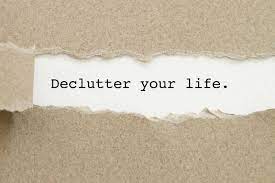Have you ever felt overwhelmed and stressed by the clutter around you? Physical clutter can impact our mental and emotional wellbeing, making it difficult to focus and find peace. Decluttering your physical space can lead to a more organized and calmer mind. In this article, we will explore 7 practical ways to declutter your life and achieve a decluttered mind.
1. Start Small
Decluttering can be a daunting task, especially if you have a lot of clutter. Starting small and focusing on one area at a time can help make the process more manageable. Begin by decluttering a small area, such as a drawer or a shelf, and then move on to bigger areas.
2. Get Rid of What You Don’t Need
One of the biggest causes of clutter is holding onto things we don’t need. Take some time to go through your belongings and get rid of what you don’t need. You can donate or sell items that are in good condition, and recycle or throw away items that are no longer useful.
3. Create a System for Organization
Once you have decluttered your space, it’s important to create a system for organization. This can include using storage containers, labeling items, and creating designated spaces for different items. Having a system in place can make it easier to maintain a clutter-free space.
4. Practice Minimalism
Minimalism is a lifestyle that involves simplifying your life by owning less and focusing on what truly brings you joy. Practicing minimalism can help you to declutter your physical space and also reduce mental clutter. It can help you to focus on what’s important and let go of the things that are not.
5. Digitize Your Life
In today’s digital age, we can accumulate a lot of digital clutter. Emails, photos, and files can quickly pile up and become overwhelming. Digitizing your life by storing files on the cloud, using email filters, and deleting old files can help to reduce digital clutter and create a more organized and stress-free digital space.
6. Schedule Regular Decluttering Sessions
Decluttering is not a one-time event but rather an ongoing process. Scheduling regular decluttering sessions can help to maintain a clutter-free space and prevent clutter from accumulating. This can be as simple as taking 10 minutes each day to tidy up or scheduling a monthly deep clean.
7. Be Mindful of What You Bring into Your Space
Finally, being mindful of what you bring into your space can help to prevent clutter from accumulating. Before buying something new, ask yourself if it’s something you really need or if it will just add to the clutter. Choosing quality over quantity and focusing on experiences rather than things can help to reduce clutter and create a more meaningful life.
Conclusion
Decluttering your life can have a significant impact on your mental and emotional wellbeing. By starting small, getting rid of what you don’t need, creating a system for organization, practicing minimalism, digitizing your life, scheduling regular cleaning up sessions, and being mindful of what you bring into your space, you can achieve a more organized and calmer mind.
FAQs
Q1. How do I know if I need to declutter my life?
If you feel overwhelmed by the clutter in your physical and digital space, find it difficult to focus, or feel stressed and anxious, it may be time to declutter your life.
Q2. How often should I declutter?
Decluttering is an ongoing process. It’s important to schedule regular cleaning up sessions to maintain a clutter-free space and prevent clutter from accumulating.
Q3. How can I get started with decluttering?
The best way to get started with decluttering is to start small. Choose a small area, such as a drawer or a shelf, and declutter it. This can help you to build momentum and motivate you to continue cleaning up other areas. It’s also important to have a plan and a system in place for organization, as this can make it easier to maintain a clutter-free space.
Q4. Can decluttering really improve my mental wellbeing?
Yes, cleaning up can have a significant impact on your mental and emotional wellbeing. A cluttered space can lead to feelings of stress, anxiety, and overwhelm. On the other hand, a decluttered space can promote a sense of calm, clarity, and focus. cleaning up can also help you to let go of the past and create space for new opportunities and experiences.
Q5. What if I struggle to let go of things?
Letting go of things can be difficult, especially if they have sentimental value or you have an emotional attachment to them. It can be helpful to ask yourself why you are holding onto something and whether it serves a purpose in your life. You can also try taking a photo of the item to preserve the memory, or passing it on to someone who will appreciate it more.



